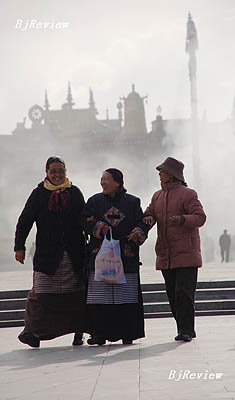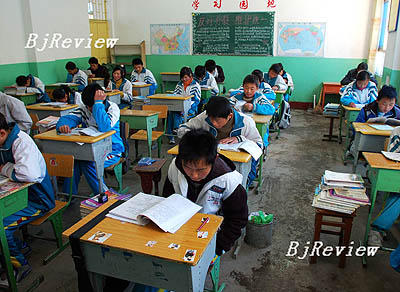It was 7:30 p.m. on March 26. Lhasa, capital of Tibet Autonomous Region and a world-famous tourist attraction, was unnaturally quiet. Many stores and restaurants had already locked their doors. There was little traffic and few pedestrians on the streets. From time to time a police car cruised by on patrol.

Tibetan women talk and laugh as they walk past the Jokhang Monastery on March 27.
"I was so afraid when I saw the bad things happening on TV," said Li Fasheng, a seven-year-old Tibetan boy who is a first-grade student at Lhasa No.1 Primary School. He was one of a few pedestrians taking a walk with his parents in the Potala Palace Square.
The bad thing the little boy referred to took place on March 14 when rioters set off a destructive rampage in the city, setting fire to buildings, looting banks, schools and shops, and randomly stoning, beating and killing civilians who they deemed not to be Tibetans.
"My school had six days off because it was dangerous for us to go out on the street," Li told Beijing Review, adding that he was not afraid now because his father told him the "bad thing" was over.
Dreadful memories
"On the morning of March 14, I heard them screaming loud outside the door. They threw stones at our hospital and broke many of the windows on the second floor," recalled Chandui, 63, a Tibetan doctor and head of the outpatient clinic of the Hospital of the Tibet Autonomous Region.
Chandui's clinic is close to the Jokhang Monastery where the riots first broke out. People were frightened by the rioters and ran into the clinic for shelter.
"I had no idea why they wanted to attack us. I was so outraged at what the mob did but all we could do was to shut the gate to keep them out," said Chandui. "The attack went on for nearly two hours, but fortunately no one was hurt in our clinic."
"I never expected such violence would happen right in front of our gate. What these thugs have done damaged peace and stability here," Chandui added.
The violent crimes have left dreadful memories in the minds of many, which will be embedded there for the rest of their lives.
Tang Qingyan, who owned a garment store in the center of Lhasa, was too sad to recall the day when five young female employees in his store were burned alive by the rioters.

Students at Lhasa No.2 Middle School are back in class. The school resumed operation on March 17 after the violent riots on March 14.
"Some of the girls had their fists tightly clenched when their bodies were found," said the shop owner, who came to Lhasa from neighboring Sichuan Province a couple of years ago. The ages of the five young victims ranged from 19 years to 24 years and one of them was a Tibetan women.
Standing in front of the charred store, which has been turned into a memorial and is visited each day by a continuous string of strangers, Tang said he would not leave Lhasa and would go on running his business because he believes only a small fraction of Tibetans really want to stir up trouble and hatred.
By March 21, 18 civilians and one police officer were confirmed dead during the unrest, according to a news release from the Tibet regional government. In addition, 241 police officers were injured, 23 critically. The damage was estimated at around 250 million yuan (about $35.7 million), said the local government.
Unity brings hope
To restore peace and stability, law enforcement authorities in Tibet issued a notice on March 15, urging lawbreakers in the riots to stop their activities and offering leniency to those who surrendered. More than 280 people involved in the March 14 riots had surrendered to the police by March 25, according to the Lhasa Police Bureau.
Investigations by the police show that some people were forced to participate in the unrest and some were even paid by secessionists to take part.
"If I didn't go, my house would have been set on fire," confessed 43-year-old Tibetan Balsang, who followed a gang of rioters to attack a shop and hit a policeman. After seeing the police notice on television, Balsang turned himself in. "I admit my guilt. I will never do anything to harm social stability again," he said.
By March 17, Lhasa had recovered stability. Shops reopened and government agencies and schools began to resume normal operations, according to Lhasa Mayor Doje Cezhug.
"I don't think such a violence will happen again," Liu Hongjun, a Sichuan businessman who owns a small food store in Lhasa, told Beijing Review. "We all want to have a peaceful social environment and violence does no good for either Tibetans or Hans."
Li reopened his store on March 20. Though the business is not as good as before because of the impacts of the riots, he said he believes it will be back to normal sooner or later.
"I've been in Lhasa for seven years and have known a lot of Tibetans. They are kind and they never hesitate to give money when they pass a beggar," Li said.
Mutual understanding and longstanding harmonious coexistence among local residents of different ethnic groups have helped the riot-shocked city to restore its faith in a good and peaceful life.
"An important lesson we draw from the recent violence is that we have to be more unified to prevent similar tragedies from happening again," said Lhapa, a Lhasa resident who works at a local hospital.
"It was so exciting to see my classmates when we returned to school on March 17 after the violence," Wang Hongchao, a Han student at the Lhasa No.2 Middle School, told Beijing Review. Wang's school also fell victim to the riots. Two of the school's buildings were burned down.
Wang said that there are three Tibetan students in his class and one of them is a good friend of him. "I don't think our friendship has been influenced by the tragedies. After all, those rioters can't represent all the Tibetans," he added.
"We feel it is necessary to enhance anti-separatism education," said Deji Zholgar, the schoolmaster. On the walls of the campus, slogans have been put up to remind the students how much national unity matters to the country.
"I hope the impacts of the recent social turmoil will be dispersed as soon as possible. Compared to adults, it's more important to sow the seeds of loving peace in these young hearts," said the schoolmaster, adding that the regional government had already allocated 15 million yuan ($2.2 million) to repair the school's two burned buildings.
The Lhasa Riots in Numbers
18 civilians killed
382 civilians wounded
242 police and armed police officers wounded or killed on duty
120 residential houses burned
908 shops burned, smashed or looted
7 schools vandalized
5 hospitals attacked
250 million yuan ($35.7 million) in damage to properties
29 arrest warrants issued by March 25 for people allegedly involved in the riots
More than 280 rioters surrendered themselves to police by March 25
(Beijing Review March 28, 2008)